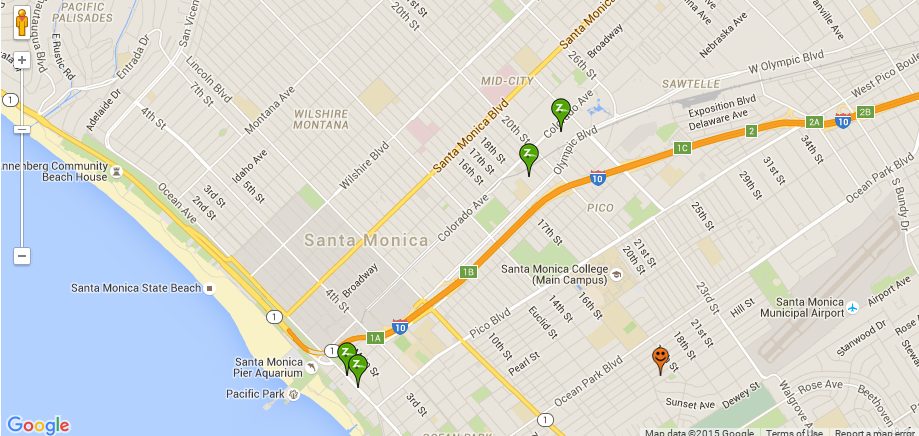
The number of car-share vehicles in Santa Monica will more than quadruple next year thanks to an agreement between the city and Zipcar.
While the car-share company currently has 12 vehicles parked at private, off-street parking spaces throughout the city, the City Council in October approved a two-year agreement that could increase that number to 60 in 2016. (Editor’s note: A Zipcar representative contacted Santa Monica Next to say that the number of new cars as well as how many of them will be parked in public spaces and how many will be parked in private spaces had not yet been finalized as of January 4.)
Car-share, like bike-share, allows members to reserve and access vehicles on demand. Users are charged an hourly fee, which includes gas and insurance, or they can pay by the day. Also, at least with Zipcar, they must return the car to the same location.
“Car-share is an important service for people who have made the leap to be a car-light household,” said Francie Stefan, strategic and transportation planing manager for the city.
It gives members the ability to have a car available when they need it without having the burden of cost or storage when they don’t, she said.
A service like car-share is likely to be useful to residents of the city who have one or no car in the household and occasionally need to use one. In 2013, the American Community Survey estimated that about 17 percent of Santa Monica renters didn’t own a vehicle.
But car-share isn’t just for those who don’t own cars. Stefan says that the Zipcar fleet has a variety of vehicle types, and can be useful if you own a smart car, but need a truck or a four-seater for some reason, she said.
Studies have shown that car-share availability can reduce vehicle ownership and increase fuel efficiency, since the vehicles in car-share fleets tend to be more efficient than most privately-owned cars.
Memberships start at $15 a year for the occasional user. That allows you to reserve and use a vehicle starting at $9.50 an hour (or $78 a day), which covers up to 180 miles of daily travel.
Car-share is just part of a much bigger attempt by the city of Santa Monica to create “a new model for mobility,” as City Manager Rick Cole puts it. This mission is one of five strategic initiatives being spearheaded by the city after the City Council in August identified specific policy priorities at a special Sunday retreat.
The other strategic initiatives are: maintaining an inclusive and diverse community, securing local control of the city land occupied by the Santa Monica Airport, taking a leadership role in regional efforts to address homelessness, and continuing the partnership supporting education.
The mobility initiative is a vital one, Stefan said.
“We have an urgent and pressing global need to reduce greenhouse gas emissions,” she said. Not only that, but people who live far away and commute into Santa Monica for work daily are sacrificing time that could be spent with family or recreating, she said.
Mobility is “a health, well-being, and quality-of-life issue,” she said. Better commutes can mean more productivity and more time for other life necessities, like exercise and time with family.
Santa Monica launched L.A. County’s first public bike-share system earlier this year, the Expo light rail is bringing passenger train service back to Santa Monica for the first time in more than half a century starting next year, and Big Blue Bus, the municipal public transit agency, is completely realigning its service network to integrate into the coming Expo line. The Big Blue Bus has also recently made its real-time arrival information available to third-party app developers to let riders know when their buses are expected to arrive.
The city is working with private transportation companies like Lyft and Uber to encourage them to work better with government and share data more readily.
Santa Monica is also pushing an aggressive citywide transit demand management plan that would require employers in some parts of the city to get their employees’ average vehicle ridership (AVR, which is a ratio of the average number of people per vehicle) as high as 2.2.
And developers of all new housing will be required to provide incentives for residents to try other modes of transportation besides just cars, including subsidized transit passes.
Santa Monica is also in the process of drafting a pedestrian action plan, modeled on the city’s award-winning bike action plan, that will lay the groundwork for creating safer, more walkable streets throughout Santa Monica.
The mobility initiative is about providing safe and convenient choices for getting around, Stefan said. Car-share is one choice, and bike-share and public transit are others.
“Mobility is at a turning point, with more people demanding choices and proactive strategies to reduce transportation emissions that contribute to global climate change,” she said.
Next year could be a very good year for mobility in Santa Monica and the region.
